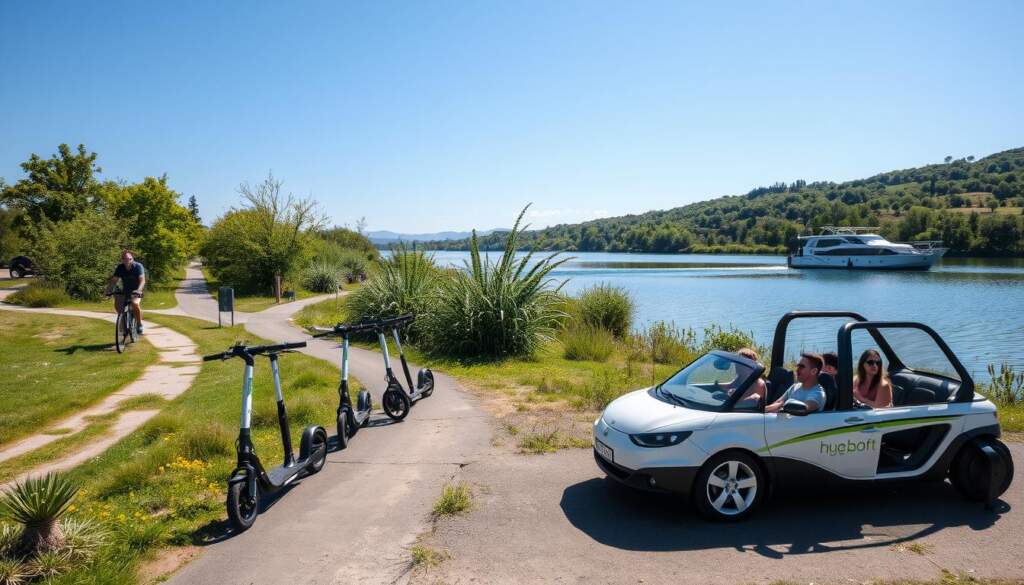Green travel, sustainable tourism, eco-conscious exploring, and low-impact vacations are keystones in protecting our planet while indulging in the myriad joys of traveling. By choosing sustainable practices, you not only ensure a unique connection with the places you visit but also contribute to the preservation of those sights and cultures for future generations. In fact, 80% of travelers consider traveling more sustainably as important1. The myriad options to reduce ecological impact range from selecting transport modes with lower emissions to choosing certified eco-friendly accommodations and adopting everyday sustainable habits that resonate with green living even when away from home.
Key Takeaways
- Adopting sustainable travel practices is paramount to preserve the environment and cultures.
- Eco-friendly accommodations can significantly reduce one’s carbon footprint on vacations.
- Low-impact transport options contribute to the reduction of greenhouse gas emissions.
- Mindful travel should embrace local traditions and support community businesses.
- Practical, everyday choices, such as using a reusable water bottle, considerably cut down on plastic waste.
- Eco-conscious exploring not only adds depth to the travel experience but also aligns with global sustainability goals.
Understanding the Environmental Impact of Travel
Travel profoundly influences our environment, affecting everything from local ecosystems to global carbon emissions. Recognizing the importance of responsible tourism is the first step towards mitigating these impacts and fostering sustainability in our travels.
Reducing Carbon Emissions in Transportation
Significant carbon emissions stem from the aviation and automotive sectors, given that tourism accounts for 8-10% of global greenhouse gas emissions2. Eco-conscious travelers are increasingly opting for direct flights which offer a reduced carbon footprint compared to multi-leg connections3. Additionally, embracing alternatives such as public transport, biking, or walking during trips can drastically diminish one’s ecological impact3.
The Significance of Sustainable Accommodation Choices
The shift towards sustainable accommodation options is gaining momentum as the sector addresses its part in global emissions. Travelers are encouraged to choose lodgings that promote energy conservation and use renewable resources. Engaging in responsible tourism also includes supporting hotels and facilities that implement recycling programs and reduce water wastage, enhancing the overall green travel choices.
The Effects of Over-Tourism on Popular Destinations
Over-tourism can lead to the depletion of local resources, increased pollution, and the disruption of communities. To combat these issues, travelers are advised to visit less-populated areas or travel during off-peak times. This approach not only helps in spreading economic benefits but also contributes significantly to preserving the ecological footprint of heavily frequented destinations.
| Aspect | Impact | Sustainable Practice |
|---|---|---|
| Air Travel | High carbon emissions | Choosing direct flights3 |
| Accommodation | Energy and water usage | Opting for green-certified hotels |
| Local Transport | Carbon emissions from vehicles | Using public transport3 |
Incorporating these green travel choices into our itineraries not only enhances the sustainability of our journeys but also fortifies the global push towards responsible tourism. By understanding and reducing our travel-related environmental impacts, we contribute to a healthier planet and more vibrant local communities.
Strategies for Low-Impact Transportation
The pursuit of low-carbon transport options is crucial for mitigating the environmental impact of travel. Trains are heralded as a prime choice for eco-friendly travel due to their significantly lower emissions compared to airplanes and cars4. Additionally, selecting direct flights over stopovers can substantially reduce carbon emissions, primarily during take-offs and landings which are the most fuel-intensive phases of a flight4.
Adopting sustainable transit methods like public transportation, including buses and ferries, integrates seamlessly into a green journey. For personal adventures, non-emission travel options such as walking and cycling not only promote health but also allow travelers to engage more intimately with local environments and cultures4. Furthermore, eco-conscious decisions like renting electric or hybrid vehicles can also contribute significantly to a low-carbon transport system during travel4.
Packing lightly is another effective strategy to reduce carbon footprint when flying. By limiting the weight aircrafts carry, we decrease fuel consumption and thus, carbon emissions4. When exploring destinations, opting for eco-friendly accommodations and supporting local businesses can amplify the positive impacts of sustainable travel practices on both environment and local economies4.


| Transport Mode | CO2 Emissions | Eco-friendliness Score |
|---|---|---|
| Trains | Low | High |
| Electric Vehicles | Very Low | Very High |
| Cycling/Walking | None | Excellent |
| Air Travel | High | Moderate |
In essence, aligning travel habits with sustainable transit values requires adopting methods that not only decrease the carbon footprint but also encourage respect and support for local cultures and economies. Whether it’s by train or through the utilization of renewable energy-driven vehicles, every choice geared towards eco-friendly travel helps pave the path towards a healthier, more green journey.
Evaluating Eco-Friendly Accommodation Options
As sustainability gains traction in the travel industry, discerning the genuine eco-conscious accommodations has become critical for environmentally-minded travelers. The growth in sustainable lodging options reflects a broader shift towards eco-responsibility in tourism. For example, New Zealand has seen a 25% increase in green lodging establishments annually over the past decade, highlighting a global trend towards sustainable accommodations5.
Identifying Genuine Green Certifications
Identifying accommodations that possess authentic green certifications is key to ensuring that your stay contributes to environmental conservation. Globally recognized certifications such as LEED or Green Key serve as reliable markers of genuine eco-friendly practices. Hotels with such certifications have enjoyed a 50% rise in consumer preference, evidencing that more travelers prioritize verified sustainable stays5.
The Role of Renewable Energy and Technology in Hotels
Renewable energy in hospitality not only reduces the environmental impact of lodging facilities but also sets a standard for the industry. Innovative technologies such as solar panels and geothermal heating are increasingly implemented in hotels committed to sustainability. These initiatives align with the growing consumer demand for establishments that utilize renewable energy sources, ensuring that eco-friendly practices are both effective and attractive to guests6.
Supporting Local Economies through Sustainable Stays
Choosing eco-conscious accommodations that utilize local resources and contribute to the local economy can amplify the positive impacts of your travel. In destinations like Costa Rica, renowned for their dedication to eco-tourism, there has been a noteworthy 15% increase in eco-tourism bookings, largely driven by accommodations that support local communities5. By staying in such places, travelers not only enjoy unique local experiences but also contribute to sustaining the economic and environmental well-being of the area.


As the landscape of travel evolves, the integration of green certifications, renewable energy, and community support defines the new standard for sustainable lodging. These practices not only enhance the guest experience but also significantly contribute to the global initiative of reducing tourism’s ecological footprint. Thus, when preparing for your next trip, consider these factors to make a genuinely positive impact on both the environment and local economies.
Practical Steps for a Greener Journey
Adopting responsible travel practices can substantially minimize your ecological impact while exploring the world. Eco-conscious travel starts with basic yet profound changes in how we prepare for and engage with our global adventures.
Opting for reusable water bottles is a standout method for reducing plastic use, directly combating the prevalence of single-use plastics that are a significant environmental threat
. Bringing a reusable water bottle not only aids in reducing plastic waste but also proves economical by saving money in tourist spots where bottled water prices are often inflated7.
Sustainable travel initiatives highlight the importance of carbon footprint minimization. For instance, opting for public transportation over private vehicles can not just save money, but also lessen your personal emissions contributing to global warming7. This can be particularly effective in walkable city centers, predominant in European destinations7.
- Travel Light: Embrace minimalism in packing; select items that are versatile and long-lasting to avoid the environmental toll associated with frequent purchases and the disposal of low-quality goods.
- Choose Eco-certified Travel Services: Support businesses that are mindful of their environmental responsibilities. Companies such as Intrepid Travel, a Certified B Corp, dedicate themselves to sustainable social and environmental practices8.
- Partake in Local and Responsible Tourism: Engage with local communities, partake in eco-friendly activities like hiking or kayaking, and favor plant-based meals to reduce the environmental impact of your food choices.
Implementing responsible travel practices goes beyond personal actions; it’s about participating in a larger movement for sustainable tourism. Consider joining forces with organizations like Sustainable Travel International or the Future of Tourism Coalition, who work tirelessly to promote sustainability in tourism around the globe8.
By embarking on our journeys with a mindset geared towards eco-conscious travel, we become part of the vital shift towards a more sustainable future. Whether it’s using digital tickets, packing refillable toiletry bottles, or supporting local artisans, every small choice adds up to a significant environmental benefit. Embrace these practices to ensure that the places we love visiting remain vibrant and beautiful for future generations.
Conclusion
In the collective march towards environmental stewardship, the choices made by eco-conscious individuals can weld together a formidable movement. The realm of green travel opens up a vista of opportunities for those aspiring to take part in sustainable adventures that leave a positive footprint on our planet. With 90% of consumers seeking sustainable travel options and feeling overwhelmed by their options9, it’s evident that environmental awareness is no longer a niche interest but is burgeoning into a mainstream endeavor. The statistics reflect the ethos of eco-friendly explorations—a sustainable approach to satisfying wanderlust that aligns with the larger context of ecological preservation.
Travelers have immense power—from the transportation they choose, making up to 82% of emissions through road vehicles9, to their support for LEED and Green Key certified accommodations known for sustainable energy and waste management practices10. By opting for non-stop flights10 and lodging that harnesses renewable energy sources, the carbon footprint of tourism, which Americans largely contribute to9, can be substantially curbed. The year-over-year increase in demand for sustainable luggage practices and the push for eco-friendly materials in their construction11 signals a shift in consumer habits towards more responsible travel essentials. Furthermore, the impact of supporting local economies and the role of entrance fees in protecting our natural heritage underline the importance of maintaining the integrity and vitality of the destinations we visit10.
Through the information and initiatives discussed in this article, it is clear that sustainable adventure is much more than a fleeting trend—it is an essential contribution to a healthier, greener, and more thoughtful world. When we speak of combating climate change or safeguarding biodiversity, the individual’s role becomes paramount, as reflected by the ratio of travelers actively seeking eco-friendly options11. By investing in green travel practices that include comprehensive support for local communities and an appreciation for robust, durable, and low-impact travel gear, the tourism sector evolves not just commercially, but ethically11. Travelers now find themselves at the nexus of adventure and responsibility, where their decisions underscore a commitment to a shared global environment—thus ensuring that the beauty and diversity of our planet thrive for generations to come.
FAQ
What is eco-friendly travel?
How do transportation choices affect my carbon footprint while traveling?
What should I look for in sustainable accommodation?
What are the benefits of traveling during off-peak seasons to avoid over-tourism?
Are there practical ways I can reduce plastic use while traveling?
Why is it important to support local economies when traveling?
Can I still participate in enjoyable activities while being eco-conscious?
Is it possible to travel sustainably on a budget?
Source Links
- Eco Friendly Travel Tips: Sustainable Adventures for the Green Traveler – https://basecampsmokymountains.com/blog/eco-friendly-travel-tips/
- World Tourism Day 2024: Exploring Sustainable Tourism – https://earth.org/eco-friendly-travel-exploring-sustainable-tourism/
- Sustainable Travel Tips for Conscientious Explorers – https://www.metropolitan-touring.com/blog/nature/sustainable-travel/
- Sustainable Travel: How to Travel With the Environment In Mind – State of Matter Apparel – https://stateofmatterapparel.com/blogs/som-blog/sustainable-travel-how-to-travel-with-the-environment-in-mind?srsltid=AfmBOootGSyan_b3viS_khp9lnznxV-r-00rc4b66iwKI8V-efppuEup
- Eco-Friendly Travel Adventure: Sustainable Travel Tips | GlobeDrifters – https://globedrifters.com/blog-post5
- What Is Eco-Friendly Travel? How to Support Sustainable Tourism & Explore Our Beautiful Planet – https://frayedpassport.com/eco-friendly-travel-reducing-your-carbon-footprint-supporting-sustainable-tourism/
- 8 Eco-Friendly Travel Tips for Sustainable Tourism – Green With Less – https://greenwithless.com/eco-friendly-travel-tips/
- The Lazy Guide to More Sustainable Travel [Simple Tips & Resources] – https://www.tiltedmap.com/easy-sustainable-travel-guide/
- 5 Essential Sustainable Travel Tips: Reduce Your Carbon Footprint And Support Local Communities For An Authentic Experience | The GREEN Program – https://thegreenprogram.com/blog/5-sustainable-travel-tips/
- Sustainable Travel: Tips for Eco-friendly Adventures – https://www.greenmilehome.com/blogs/news/sustainable-travel-tips-for-eco-friendly-adventures
- The Rise of Sustainable Travel: Eco-Friendly Tips for the Modern Adventurer – https://floh.com/blogs/news/the-rise-of-sustainable-travel-eco-friendly-tips-for-the-modern-adventurer?srsltid=AfmBOorqD78o7Cy5JV6QzMxKSmuv4RKgt2apHAjjR7Nma5z68S7iisXR



